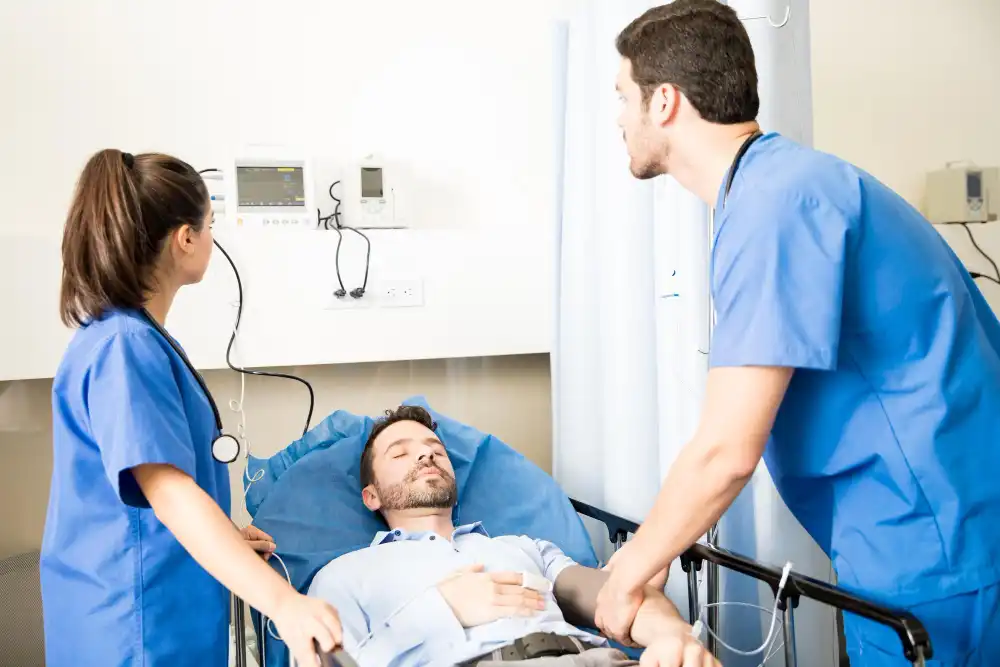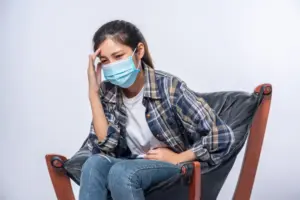24/7 Advanced Emergency Care and Trauma Services
24/7 Emergency Care with rapid response, advanced treatment, and expert support.

Emergency Care
Emergencies don’t wait they strike without warning. Whether it’s a heart attack, accident, stroke, or sudden collapse, the first few minutes often decide life or death. That’s where Emergency Care steps in — the first and most vital link in saving lives. At VS Hospitals, Chennai, the Department of Emergency Medicine operates 24/7, ensuring immediate, expert, and compassionate care for every emergency, no matter how critical.
With highly trained doctors, advanced life-support systems, and rapid response protocols, VS Hospitals stands as one of Chennai’s most trusted destinations for emergency and trauma care. Every second counts — and here, every second is used wisely.

Early Detection Saves Lives
Early detection and treatment are crucial for improving the chances of survival. If you notice any concerning symptoms, consult a healthcare provider immediately.
Emergency Care
Chest Pain or Pressure
Pain spreading to the arm, neck, or jaw may signal a heart attack.
Breathing Difficulties
Sudden shortness of breath or choking requires immediate attention.
Loss of Consciousness
Fainting or unresponsiveness may indicate serious internal issues.
Severe Headache or Confusion
Can point to stroke, brain injury, or high blood pressure crisis.
Uncontrolled Bleeding
Persistent bleeding from wounds or injuries can lead to shock.
Sudden Weakness or Numbness
Especially on one side of the body a possible stroke symptom.
Blood in Urine
Hematuria - pink, red, or dark urine, the most common symptom
Frequent Urination
Feeling the need to urinate frequently, even when bladder is not full
Painful Urination
Experiencing pain or burning sensation while urinating
Back or Pelvic Pain
Pain that occurs as the cancer grows and spreads
Unexplained Weight Loss
Significant weight loss not related to diet or exercise
Fatigue
Feeling unusually tired or weak without a clear cause
Meet Our Expert Emergency Care Specialists
Emergency Care
Smoking
Smoking is one of the leading causes of bladder cancer. Chemicals in tobacco smoke can damage the lining of the bladder, increasing the risk.

Gender
Men are at a higher risk of developing bladder cancer than women.

Chronic Bladder Infections or Inflammation
Conditions such as bladder infections and long-term bladder inflammation can increase the risk.

Exposure to Chemicals
Prolonged exposure to certain chemicals, especially those used in the dye industry, rubber production, and chemical manufacturing, increases the risk.

Chronic Diseases
Heart disease, diabetes, hypertension, asthma, or COPD.

Age
Elderly patients and infants are more prone to life-threatening complications.

Smoking and Alcohol Consumption
Increases risk of stroke, heart attack, and liver failure.

Unhealthy Lifestyle
Poor diet, obesity, and lack of exercise contribute to cardiac and metabolic emergencies.

Stress
Chronic stress can trigger hypertension or heart irregularities.

Occupational Hazards
Exposure to chemicals, machinery, or trauma-prone environments.

Environmental Factors
Extreme heat, cold, or pollution can worsen existing conditions.

Neglected Symptoms
Ignoring early signs like chest pain or fatigue often leads to emergencies.

Poor Road Safety
High-speed accidents and lack of helmet/seatbelt use contribute to trauma cases.

Emergency Care
Diet and Nutrition
Prevention
Diagnosis
Key Services
Key Facilities
While emergency care focuses on immediate survival, nutrition plays a crucial role in recovery. After stabilization, patients at VS Hospitals receive individualized nutritional plans to regain strength and aid healing.
Post-Emergency Nutrition Guidelines:
- Hydration First: Replenish fluids and electrolytes after dehydration or shock
- Protein-Rich Foods: Support tissue repair after trauma or surgery
- Heart-Healthy Meals: Low-sodium, low-fat diets for cardiac patients
- Diabetic Control: Balanced carbohydrate intake for glucose stability
- Soft Diets: For patients recovering from GI bleeding or abdominal pain
- Micronutrients: Include vitamins and minerals for immune support
A team of clinical dietitians at VS Hospitals collaborates with doctors to design personalized diets that enhance healing and prevent relapse.
Prevention is the best emergency care strategy. By identifying risks early and building healthy habits, many emergencies can be avoided altogether. VS Hospitals actively promotes preventive education through its outreach and wellness programs.
Preventive Measures:
- Routine Health Screenings: Regular blood pressure, sugar, and cholesterol checks
- Cardiac Risk Profiling: Especially for those over 40 years old
- Vaccination Drives: Preventing infectious diseases like flu and pneumonia
- Safe Driving Habits: Wearing helmets, avoiding alcohol while driving
- Healthy Diet & Exercise: Reduces obesity and cardiovascular strain
- Stress Management: Yoga, mindfulness, and balanced work-life routine
- Medication Adherence: Following prescriptions without interruption
- Prompt Medical Consultation: Early visit for persistent pain, fever, or weakness
By following these habits, individuals significantly lower their chances of emergency hospital visits and when emergencies do arise, VS Hospitals stands ready.
When a patient arrives at the Emergency Department, time is of the essence. The goal is rapid diagnosis and stabilization. At VS Hospitals, every emergency case is managed through a streamlined, systematic approach that prioritizes life-saving actions.
The diagnostic process includes:
- Triage Assessment: Patients are prioritized based on condition severity; critical cases receive immediate attention.
- Primary Evaluation: Airway, breathing, and circulation (ABCs) assessed with continuous vital monitoring.
- Point-of-Care Testing: Rapid ECG, blood glucose, cardiac markers, and ABG testing for quick diagnosis.
- Imaging & Scans: Portable X-ray, CT, or ultrasound used for trauma, stroke, or internal injuries.
- Laboratory & Specialist Support: Blood and organ function tests with prompt specialist consultations.
- Emergency Procedures: Life-saving interventions like intubation, defibrillation, and wound or chest management.
This rapid, structured diagnostic process ensures that patients at VS Hospitals receive accurate treatment within minutes of arrival.
The Emergency Department at VS Hospitals provides world-class emergency and trauma management backed by expertise, technology, and teamwork.
Key services include:
- 24/7 Emergency Response & Ambulance Care: Round-the-clock operation with advanced life-support ambulances and trained paramedics.
- Cardiac & Stroke Management: Immediate ECG, clot-busting therapy, angioplasty, and 24-hour stroke protocols with CT scans.
- Trauma & Accident Care: Dedicated trauma units for fractures, head injuries, and multi-trauma emergencies.
- Pediatric, Neonatal & Toxicology Support: Specialized care for children, newborns, and poisoning cases.
- Infection, Burns & Respiratory Management: Isolation care, sepsis control, ventilator support, and reconstructive treatment for burns.
- Post-Emergency Rehabilitation: Physiotherapy and recovery programs to restore strength after stabilization.
At VS Hospitals, the emergency team works hand-in-hand with all specialties to ensure holistic care from the ER to ICU to complete recovery.
The Emergency & Trauma Centre at VS Hospitals is built to global standards with an infrastructure designed for speed, precision, and safety.
Key facilities include:
- Fully Equipped Emergency Room & Resuscitation Unit: Multiple high-dependency bays and crash units for critical stabilization.
- 24/7 Ambulance & Transport Network: GPS-enabled ambulances with ventilators, defibrillators, and cardiac monitors.
- Advanced Diagnostic & Operating Support: On-site CT, MRI, ultrasound, and emergency theatres for rapid interventions.
- Comprehensive Critical Care Backup: Seamless transfer to ICU, CCU, NICU, or SICU for continued intensive monitoring.
- Blood Bank, Pharmacy & Infection Control: Immediate access to blood, medicines, and isolated bays for contagious cases.
- Specialized Trauma & Family Support: Expert trauma teams and dedicated counseling areas for patient families.
Every facility is designed to ensure faster diagnosis, quicker treatment, and safer recovery making VS Hospitals one of the top emergency care centers in Chennai.
Top Medical Facilities at Our Multispeciality Hospital – Here’s What Makes Us Different!
Ready to Begin Your Emergency Care Journey?
Learn More About Emergency Care
Frequently Asked Questions
VS Hospitals’ Emergency Department operates 24/7 with a rapid triage system, ensuring patients are attended to within minutes of arrival. Ambulances are GPS-enabled for faster response, and specialists are on standby for cardiac, stroke, trauma, and pediatric emergencies at any hour of the day.
VS Hospitals provides fully equipped advanced life-support (ALS) and basic life-support (BLS) ambulances with trained paramedics. The ambulances are fitted with ventilators, defibrillators, oxygen support, and real-time monitoring equipment to ensure safe, stable transfer of patients during emergencies.
Yes. VS Hospitals’ Emergency Department is designed with multiple high-dependency treatment bays, a dedicated trauma unit, and an emergency operating theatre. With multidisciplinary teams and rapid coordination, the hospital can efficiently manage several critical cases at the same time without delay.
